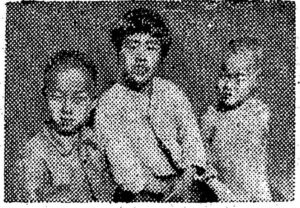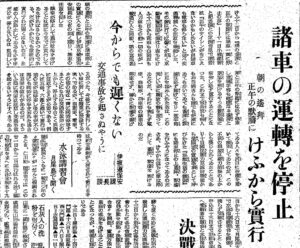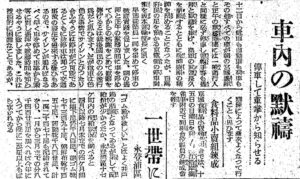This photo captures a scene inside a Seoul streetcar in 1943 as the passengers respond to the sound of sirens to observe the mandatory daily noon Moment of Silence to honor Imperial Japanese soldiers.
The propaganda narrative says that they were praying for the Imperial soldiers, but most likely the thoughts running in their minds ranged from fear, resignation, to anger. After all, they had no choice but to comply.
People in the British Commonwealth may find it similar to Remembrance Day, when a two-minute silence is observed at 11 am every year on November 11, only this silence was observed everyday at 12 pm. The other daily mandatory ritual was the 7 am Kyūjō Yōhai ritual (宮城遥拝), which involved deeply bowing several times in the direction of the Imperial Palace in Tokyo while standing, vowing loyalty to the Emperor. The two prayers were mandatory and enforced in Korea, but not so in mainland Japan. In August 1943, the rules were made stricter by requiring vehicles to stop in the middle of the road or the tracks at 7 am and 12 pm to perform the prayers.
The second article shows some orphan children who were observing the Moment of Silence at a police station before they were taken away by Seoul Social Services, possibly to an abusive orphanage like the Seongam Academy.
(Translation)
Gyeongseong Ilbo (Keijo Nippo) August 25, 1943
A Great Silence Pledging to Win the War
100 million people march to take up the spirit of the Founding Fathers of Ancient Japan
When the sirens sound at noon, the city and the countryside immediately stop and become quiet. Workers stop working, pedestrians stop walking, trains and cars stop driving, and everyone inside vehicles stand up in silence for this solemn hour. At this moment, they offer infinite gratitude for the blood-soaked toil of the generals who are fighting valiantly to destroy the United States and Britain on the pathetically brutal front lines. They pray in this moment, "May the heroic souls, who have become the demons of national defense, rest in peace forever". They also make a firm pledge of victory to further increase production capacity and fight hard at their workplaces to win this decisive battle. The silent prayer at noon is a building block of wartime life, and people on the home front should not neglect this holy moment, and they should offer a solemn and pious silent prayer that emanates from their patriotic hearts. [Photo: Silent prayer in a train]
Source: https://www.archive.org/details/kjnp-1943-08-25
Gyeongseong Ilbo (Keijo Nippo) November 15, 1942
Moment of silence observed even by mute and lost children
◇…. Around 9:00 a.m. on November 14th, Kim Gan-lan (김간란/金干蘭) (10-years-old), Oh Eung-cheon (오응천/呉應天) (7-years-old), and a mute boy aged around 3 wandered into the Dongdaemun Police Station. But even in the hearts of these lost children, the spirit of the Imperial people is strongly nurtured.
◇…. When the noon siren sounded, they offered a pious silent prayer to remember the hard work of the front line generals. The policemen watching this cute scene were moved to tears.
◇…. As they ate pieces of bread, the three lost children were led away by an old man from the Social Services Division of the Seoul Prefectural Government. [Photo: From left to right, Eung-cheon, Gan-lan, and the mute boy]

Source: https://www.archive.org/details/kjnp-1942-11-15
(Transcription)
京城日報 1943年8月25日
必勝誓う大いなる沈黙
肇国の精神を承け一億の進軍
正午のサイレンが響き渡ると一瞬にして街も農村も動かず静かに籠る。職場に挺身する者は仕事を止め、道路を歩行する者はピタリと足をとどめ、電車も自動車も運転を停止して車中の者は静かに此の厳粛なる一刻に起立。凄愴苛烈な前線に思いを致し生死を超越して米英撃滅に勇進力闘している将兵の血のにじむ労苦に無限の感謝を捧げ、「護国の鬼と化した英魂よ、永久に安かれ」と祈念するこの一瞬間。さらにさらに生産力増強に職場に敢闘して断じて決戦を勝ち抜かんとする必勝の誓いを固めるのだ。正午の黙祷は決戦生活の建設であり、戦う銃後国民は一人としてもこの聖なる一刻を忽せにすることなく、愛国の熱い赤心からほどばしり出る厳粛敬虔な黙祷を捧ぐべきである。【写真=電車内の黙祷】
京城日報 1942年11月15日
唖で迷子の坊やも沈黙
◇...十四日午前九時ごろ、東大門署へ金干蘭ちゃん(一〇)、呉應天君(七つ)、それに三つ位の唖の坊やが迷い込んで来ました。でもこの迷い子達の胸にも皇民精神は根強く培われている。
◇...お昼のサイレンが鳴り渡ると敬虔な黙祷を捧げ、第一線将兵の労苦を偲ぶ可愛らしい姿に警察官を泣かせました。
◇...この迷い子三名は一片のパンに舌鼓を打ちながら府庁社会課のオジサンに手を引かれて行きました。【写真=向かって左から応天君、干蘭ちゃん、唖の坊や】








